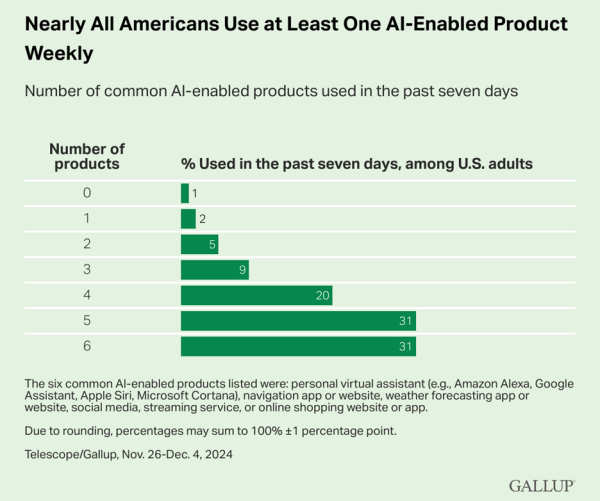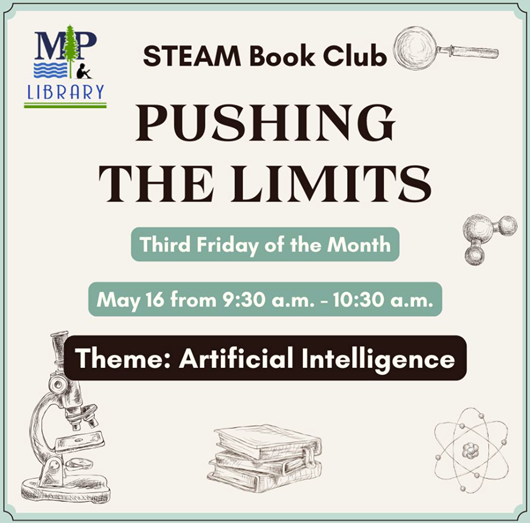How public libraries are teaching AI and digital literacy skills
Part 3 of a series on AI for public library staff

Public libraries have played an important role in fostering and promoting digital literacy skills within their communities. The rapid developments of AI present the latest opportunity for public libraries to engage with and educate patrons on technology. This includes helping people to understand what AI is, when it can be useful, and what cautions to consider. Introducing and exploring AI is a chance for the library to champion digital and information literacy and demonstrate leadership. This article outlines some ideas and examples for AI programming in public libraries, along with resources to help your library develop local events.
Why the public needs to know about AI
Jobs across the economy are increasingly seeking AI skills, but a 2025 study found that 34% of Gen Z adults in the Heartland were slightly prepared or not at all prepared to use AI in their future job or career. While not everyone has intentionally used AI tools, it’s becoming more likely that they are still impacted by AI in their daily life. From weather forecast apps to social media apps to online shopping, a 2025 Gallup poll revealed that nearly all Americans use at least one AI-enabled product weekly.

One example of how AI is negatively impacting the public is shown in research that demonstrates that the entire phishing process—the deceptive messages that pretend to be from legitimate sources and aim to trick users into giving away personal information or clicking on harmful links—can be automated using AI, which reduces the costs of phishing attacks by more than 95% while achieving equal or greater success rates. Understanding these risks and increased challenges is essential to online safety and privacy.
There are also positive opportunities for the general public to benefit from engaging with AI tools, such as translation capabilities, preparing for job interviews, and writing assistance. Accessibility improvements also hold considerable promise, where AI can power tools such as screen readers, text-to-speech software, navigation aids, and software to make digital content more accessible and usable.
Awareness of other areas of concern, including the environmental impacts related to using AI technology, and the ethical implications of unauthorized use of copyrighted works in AI algorithms and outputs, all contribute to helping individuals make informed decisions about how, when, or if, to use AI tools.
Different ways to educate the public about AI
Libraries are taking a range of approaches to introduce the public to AI. In the webinar “Media literacy education for adult audiences: Demystifying AI,” Dr. Brandy McNeil, Deputy Director of Branch Programs and Services at New York Public Library and President-Elect of the Public Library Association, shares specific ideas to engage with patrons and programming on AI. Here’s a selection of her suggestions:
- Conduct Tech Talks from industry experts, local small businesses that might be using it, or patrons that might use it in unique ways
- Create classes such as:
- AI 101 or AI Basics
- How to use AI (can be specific to a tool)
- How to use AI for … (can be a specific task)
- Being safe with AI (covering the AI concerns)
- Be sure to make classes interactive and explain the pros and cons
- Create social experiments such as:
- Using games or quizzes to see if people can identify whether an image or text was created with AI.
- Create AI reading lists
- Host an AI movie night and have an open community discussion about AI
Looking for more ideas? Let’s dive into what other libraries have offered to their communities.
AI-focused programming examples
Library staff are delivering creative and practical public programs about specific use cases for AI. Here’s a round-up of programming ideas offered by libraries:
- AI for job seeking
City of Santa Clara Library (CA) hosted a program called “AI Tools for Job Seekers” to help participants understand how HR professionals use AI in the recruitment and hiring process. The session also introduced learners to AI tools that can help people in their job search, including how to optimize a resume, prepare for an interview, or map out a job search. - AI for genealogy research
Genealogy is a popular topic among community members. Allen County Public Library (IN) offered a virtual program, “Building your family’s story using AI on FamilySearch.” The presenter demonstrated some of the AI-powered features of FamilySearch, including full-text search, handwriting recognition, and optical character recognition, to search records. - AI-themed book clubs
Mt. Pleasant Public Library (TX) hosted a STEAM book club to explore the world of artificial intelligence. Participants were encouraged to select and read a book about AI beforehand and bring insights to share. Library staff were also available to offer book recommendations. Super bonus – the library served breakfast to participants!

- AI hackathon for middle school students
The Palo Alto City Library (CA) hosted an AI Hackathon with a local partner, which began with a discussion from tech industry mentors and high school leaders about AI—how it works, its limitations, and its potential. Then, students explored AI tools and developed solutions to real-world problems, including minimizing wildfire damage, and understanding and preventing zoonotic diseases (those that spread from animals to humans and vice versa). - Avoiding fraud and scams
The Rocky River Public Library (OH) invited the community to attend “Artificial intelligence and scams” to learn about how bad actors are using AI to scam and defraud innocent people. - AI for grant writing
The Pottsboro Library (TX) put on a technology class, “Intro to grant writing with AI,” where participants learned how to use the power of AI to increase capacity and skills in applying for grants. - AI for image creation
The Canmore Public Library (Alberta, Canada) offered the program, “Identifying AI images,” where participants explored how AI images are made, watched a demonstration of the AI generation process, learned tips and tricks for spotting AI images, and then tested their knowledge with a quiz.
Wrapping-up
As is common with any technology, AI is an area that is moving quickly, and library staff are responding to these changes by learning alongside their communities. Offering AI-focused public programming helps people to stay up to date with technology, develop their skills, and even protect themselves from scams and fraud. We’re looking forward to seeing how these offerings in libraries continue to evolve.
Coming up next for this series, our final article will explore larger issues surrounding AI and libraries, and examine how libraries can embrace a leadership role in this conversation.
Curated book and resource lists about AI
Some library staff are compiling book lists, podcasts, and websites to offer patrons who want to learn more.
- Chicago Public Library’s Book Lists about AI
- St. Joseph County Public Library’s staff recommendations for AI-themed books
- Palo Alto City Library has compiled a Top AI Movies list.
Before you start
The development of AI tools is moving quickly. If AI is unfamiliar to you, consider reading the first two articles in this series: “Introduction to AI" and “Evolving technology: Using AI on the job.” And before exploring these tools and how they can impact your work, check if your library or municipality has any policies governing the use of AI.
